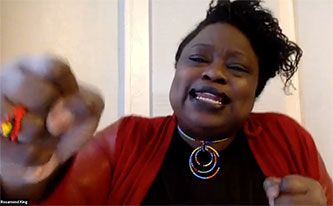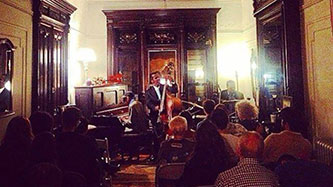American Music Review
Vol. L, Issue 1, Fall 2020
When I wrote the last Institute News in Spring 2020, like you I had no sense of the way global and local events would unfold over the next months and into the autumn. After the brutal murder of George Floyd this past summer, we at the Hitchcock Institute took a look inward and wrote our first ever mission statement, which we published in our Spring 2020 issue. In keeping with that mission, we have revised our website, www.hisam.org, to display the statement prominently on the homepage, as well as to reflect some exciting programming and additions to our Board of Advisors.
For the first time ever, the Music in Polycultural America Speaker Series took place in a totally virtual environment, allowing participants and speakers to attend remotely. (Follow us on Facebook and Twitter for future events!) While the public health advantages to this set-up are obvious, the access to speakers who might not be able to join us ordinarily because of distance and/or travel expenses is also exciting to contemplate. Like the transformation of American Music Review to its current format as an online periodical, this temporary shift in format for the MPA Speaker Series might hail a new era of hybridity in which we can all think more broadly about speaker invitations without some of the previous barriers to access such as disability, inequities in institutional funding, and borders.
Our first virtual speaker, Dr. Guthrie P. Ramsey, Jr. of the University of Pennsylvania, joined us from Philadelphia where he shared not only his deep knowledge of American jazz history in his home city, but also an intimate listen into his family history of jazz performance. Videos featuring music by Ramsey’s ensemble Musiqology, like art film miniatures, were highlights of the discussion, led by Hitchcock Institute colleague Dr. Jeffrey Taylor. The next speaker on the series, Dr. Philip Ewell of Hunter College, CUNY, tackled the complex topic of Music Theory’s Racial Frame, a subject that has attracted attention inside and outside the music fields. Ewell brought his own experiences as a Black scholar in the field of Music Theory—still more than 90% white and male—to bear on his talk, which centered on the nineteenth-century Austrian music theorist Heinrich Schenker. Using evidence from personal conversations, emails, and recent scholarship suggesting that Schenker’s theories uphold structures of white power, Ewell argued in favor of decolonizing both his field and music curricula.
Dr. Rosamond S. King, Director of the Wolfe Institute for the Humanities at Brooklyn College, as well as Associate Professor of English and Caribbean Studies, was joined by our own Dr. Malcolm Merriweather, Director of Choral and Voice Programs, for a discussion of the role of the poet in setting words into vocal music. Dr. King began with a performance of her poetry, highlighting the ways she vividly animates her unique method of positioning text on the page.
King’s reading—more akin to a musical performance—brought up questions about code switching, communication between the composer and the poet, and what kinds of “voices” the audience hears when the musical work is finally set. Continuing with this semester’s theme of talking openly about race and gender in the US, Professors King and Merriweather touched on the possibilities and complications of being Black artists working and teaching in the academy.
Finally, in an exceptionally rich hour of oral history, Brooklyn College Global Jazz MM student Victor Solano brought Bedford-Stuyvesant’s venerable jazz tradition to light in his conversation with jazz bassist Eric Lemon and Brownstone Jazz business manager Debbie McClaine. Lemon is a fixture in the Bed-Stuy jazz scene, and has been playing and teaching in the historically Black neighborhood in Brooklyn since the late 1960s. Together he and McClaine founded Brownstone Jazz, an internationally known venue for postwar jazz performances housed in their famously restored Victorian parlor floor restaurant and Sankofa Aban B&B. Friday night fish fries and Sunday jazz brunches have become fixtures in the neighborhood, but during COVID-19, the weekly (weather permitting) stoop jams attract both street and foot traffic. They come for the music and stay to witness the mural that chronicles the names of all the Black lives cut short by police brutality in the U.S.
On an even more local level, the faculty and staff here at the Hitchcock Institute have had a busy and productive semester, in spite of meeting only via Zoom for more than nine months of 2020! Jeffrey Taylor has handed over the reins of the HISAM Directorship to Stephanie Jensen-Moulton, but he will continue to be involved in many aspects of the Institute’s work and programming. After a successful sabbatical (even in the face of COVID) Jeff continues work on a book on Earl Hines and his fellow Chicago pianists. He will be contributing an essay to an upcoming volume on the historical role of the player piano and its music. Ray Allen continues his research into Brooklyn Carnival music with a joint-biography project with Brooklyn calypso/soca music arranger Frankie McIntosh.
In addition to her continued research and writing on rockumentaries, Hitchcock Institute Managing Editor Lindsey Eckenroth has been curating a series of playlists for the magazine Don’t Take Pictures. She was also delighted to play a single flute gig: a (socially-distanced) recording session for Whitney George’s new chamber work HOME. Institute Assistant Dr. Whitney George successfully defended her dissertation “For the Love of Inner Voices,” which includes an orchestration of the formal two scenes of Miriam Gideon’s television opera Fortunato; conducted CityLyric’s production of ThreePenny Opera, which was released virtually in October of 2020, featuring instrumental performances by The Curiosity Cabinet; released HOME, a radio drama performed by The Curiosity Cabinet with text by Bea Goodwin, adapted from a short story by Charlotte Perkins Gilman; and recorded “A Night in Brooklyn” with a text by New York poet Denis Nurske, which was digitally released in November 2020 with Music on the Main as a commission by the Five Borough Songbook. Congratulations, Dr. George!
In my new role as Director, I’ve kept busy reorganizing the Institute’s activities for a virtual workplace world. In addition, I was honored to be invited to speak on the University of Michigan’s “See Better, Hear Better, Know Better: A Two-Day Online Event on Deconstructing Race and Gender Biases in Music.” My talk focused on White Fragility in the Music Fields, and can be viewed here. Through my ongoing work as chair of the AMS Committee on Women and Gender, I organized two sessions at the Annual Conference in November: the first featured Professor Terri Lyne Carrington in conversation with Dr. Farah Jasmine Griffin, discussing Jazz, Race, and Gender; and the second unpacked the idea of what a “slow professor” might mean for the academy.1 Work continues on my edited collection of essays about American popular songs as domestic violence narratives, as well as my long, long-term project on opera and disability since 1935.
This issue, while remembering colleagues lost to us in 2020, also expands on some of the ideas brought out in our speaker series this semester. We continue to follow the directives set out in the new HISAM mission. My hope, as a new director in a new decade, is to remain on this path and gather as many staff, students, and faculty to help us in broadening the reach of anti-racist work in American Music studies and in the larger scope of the academy.
In solidarity,
Stephanie Jensen-Moulton
Notes
- 1 Maggie Berg and Barbara K. Seeber, The Slow Professor: Challenging the Culture of Speed in the Academy (University of Toronto Press, 2016).








